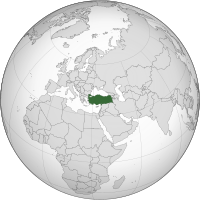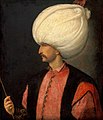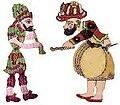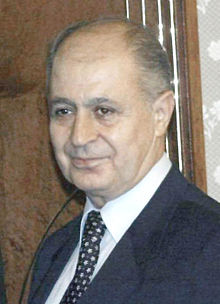Portal:Turkey
Merhaba! Türkiye portalına hoşgeldiniz. Hi! Welcome to the Turkey portal.
 | |

| |
Turkey, officially the Republic of Türkiye, is a country mainly in Anatolia in West Asia, with a smaller part called East Thrace in Southeast Europe. It borders the Black Sea to the north; Georgia, Armenia, Azerbaijan, and Iran to the east; Iraq, Syria, and the Mediterranean Sea (and Cyprus) to the south; and the Aegean Sea, Greece, and Bulgaria to the west. Turkey is home to over 85 million people; most are ethnic Turks, while ethnic Kurds are the largest ethnic minority. Officially a secular state, Turkey has a Muslim-majority population. Ankara is Turkey's capital and second-largest city; Istanbul is its largest city, and its economic and financial center, as well as the largest city in Europe. Other major cities include İzmir, Bursa and Antalya.
Human habitation began in the Late Paleolithic. Home to important Neolithic sites like Göbekli Tepe and some of the earliest farming areas, present-day Turkey was inhabited by various ancient peoples. Hattians were assimilated by the incoming Anatolian peoples. Increasing diversity during Classical Anatolia transitioned into cultural Hellenization following the conquests of Alexander the Great; Hellenization continued during the Roman and Byzantine eras. The Seljuk Turks began migrating into Anatolia in the 11th century, starting the Turkification process. The Seljuk Sultanate of Rum ruled Anatolia until the Mongol invasion in 1243, when it disintegrated into Turkish principalities. Beginning in 1299, the Ottomans united the principalities and expanded; Mehmed II conquered Istanbul in 1453. During the reigns of Selim I and Suleiman the Magnificent, the Ottoman Empire became a global power. From 1789 onwards, the empire saw major transformation, reforms, and centralization while its territory declined.
In the 19th and early 20th centuries, persecution of Muslims during the Ottoman contraction and in the Russian Empire resulted in large-scale loss of life and mass migration into modern-day Turkey from the Balkans, Caucasus, and Crimea. Under the control of the Three Pashas, the Ottoman Empire entered World War I in 1914, during which the Ottoman government committed genocides against its Armenian, Greek and Assyrian subjects. After its defeat, the Ottoman Empire was partitioned. The Turkish War of Independence resulted in the abolition of the sultanate in 1922 and the signing of the Treaty of Lausanne in 1923. The Republic was proclaimed on 29 October 1923, modelled on the reforms initiated by the country's first president, Mustafa Kemal Atatürk. Turkey remained neutral during most of World War II, but was involved in the Korean War. Coups in 1960 and 1980 interrupted the transition to a multi-party system.
Turkey is an upper-middle-income and emerging country; its economy is the 18th- or 11th-largest in the world. It is a unitary presidential republic. Turkey is a founding member of the OECD, G20, and Organization of Turkic States. With a geopolitically significant location, Turkey is a regional power and an early member of NATO. An EU-candidate, Turkey is part of the EU Customs Union, CoE, OIC, and TURKSOY. Turkey has coastal plains, a high central plateau, and various mountain ranges; its climate is temperate with harsher conditions in the interior. Home to three biodiversity hotspots, Turkey is prone to frequent earthquakes and is highly vulnerable to climate change. Turkey has universal healthcare, growing access to education, and increasing innovativeness. It is a leading TV content exporter. With 21 UNESCO World Heritage sites, 30 UNESCO intangible cultural heritage inscriptions, and a rich and diverse cuisine, Turkey is the fourth most visited country in the world. (Full article...)
Selected article -
The Gallipoli campaign, the Dardanelles campaign, the Defence of Gallipoli or the Battle of Gallipoli (Turkish: Gelibolu Muharebesi, Çanakkale Muharebeleri or Çanakkale Savaşı) was a military campaign in the First World War on the Gallipoli peninsula (now Gelibolu) from 19 February 1915 to 9 January 1916. The Entente powers, Britain, France and the Russian Empire, sought to weaken the Ottoman Empire, one of the Central Powers, by taking control of the Ottoman straits. This would expose the Ottoman capital at Constantinople to bombardment by Entente battleships and cut it off from the Asian part of the empire. With the Ottoman Empire defeated, the Suez Canal would be safe and the Bosphorus and Dardanelles straits would be open to Entente supplies to the Black Sea and warm-water ports in Russia.
In February 1915 the Entente fleet failed when it tried to force a passage through the Dardanelles. The naval action was followed by an amphibious landing on the Gallipoli peninsula in April 1915. In January 1916, after eight months' fighting, with approximately 250,000 casualties on each side, the land campaign was abandoned and the invasion force was withdrawn. It was a costly campaign for the Entente powers and the Ottoman Empire as well as for the sponsors of the expedition, especially the First Lord of the Admiralty (1911–1915), Winston Churchill. The campaign was considered a great Ottoman victory. In Turkey, it is regarded as a defining moment in the history of the state, a final surge in the defence of the motherland as the Ottoman Empire retreated. The struggle formed the basis for the Turkish War of Independence and the declaration of the Republic of Turkey eight years later, with Mustafa Kemal Atatürk, who rose to prominence as a commander at Gallipoli, as founder and president. (Full article...)General images
Did you know -
- ... that Fatma Aliye Topuz (1862-1936), whose portrait illustrates the reverse of the current 50 Turkish lira banknote, is credited as the first female Turkish and Muslim writer? (May 5, 2009) Wikipedia:Recent additions 244
- ... that an Egyptian army of 1,500 was defeated by 300 women and old men of Diro during the Egyptian Invasion of Mani in 1826? (January 22, 2007) Wikipedia:Recent additions 117
- ... that the construction of the Çanakkale Martyrs' Memorial (pictured), commemorating over 250,000 Turkish soldiers fallen during the Battle of Gallipoli in WWI, was completed with nationwide financial contributions? (January 11, 2008) Wikipedia:Recent additions 199
- ... that the remains of the Bogdan Saray in Istanbul lie inside a tire shop? (April 13, 2012)
- ... that the Cossack Hetman and the later Muscovite voyevoda Petro Doroshenko signed a treaty with Sultan Mehmed IV recognizing the Cossack Hetmanate as a vassal of the Ottoman Empire? (March 8, 2006) Wikipedia:Recent additions 56
- ... that Mehmet Gürs, a Turkish chef of Scandinavian descent, called his Istanbul restaurant Mikla, which is derived from Miklagard, the Viking name of the city in the 10th century? (November 15, 2012)
- ... that Artin Penik, a Turkish-Armenian, set himself on fire in protest of the terrorist attacks against Turks by the Armenian Secret Army for the Liberation of Armenia (ASALA)? (February 25, 2007) Wikipedia:Recent additions 121
Selected picture
Selected biography -
Ahmet Necdet Sezer (Turkish pronunciation: [ah'med nedʒ'det se'zæɾ]; born 13 September 1942) is a Turkish statesman and judge who served as the tenth president of Turkey from 2000 to 2007. Previously, he was president of the Constitutional Court of Turkey from January 1998 to May 2000. The Grand National Assembly of Turkey elected Sezer as president in 2000 after Süleyman Demirel's seven-year term expired. He was succeeded by Abdullah Gül in 2007.
Following his legal career, Sezer became a candidate for the presidency with the joint support of many political parties in Parliament. Following the 2000 presidential election, he took an ardent secularist approach on issues such as the headscarf, holding the view that secularism in Turkey was under threat. A quarrel between Sezer and Prime Minister Bülent Ecevit in 2001 led to a financial meltdown, attributed to the weakness of the coalition government as well as to the large debt owed to the International Monetary Fund. (Full article...)Selected video -
Selected quote -
| “ | Heroes who shed their blood and lost their lives! You are now lying in the soil of a friendly country. Therefore rest in peace. There is no difference between the Johnnies and Mehmets to us where they lie side by side here in this country of ours. You, the mothers, who sent their sons from far away countries wipe away your tears; your sons are now lying in our bosom and are in peace. After having lost their lives on this land they have become our sons as well. | ” |
Recognized content
Provinces
Related portals
Religions in Turkey
Neighbouring countries
Countries with related heritage
WikiProjects
Turkish wikipedia
 |
There is a Turkish version of Wikipedia, the free encyclopedia. |
Wikimedia
The following Wikimedia Foundation sister projects provide more on this subject:
-
Commons
Free media repository -
Wikibooks
Free textbooks and manuals -
Wikidata
Free knowledge base -
Wikinews
Free-content news -
Wikiquote
Collection of quotations -
Wikisource
Free-content library -
Wikiversity
Free learning tools -
Wikivoyage
Free travel guide -
Wiktionary
Dictionary and thesaurus















































































































